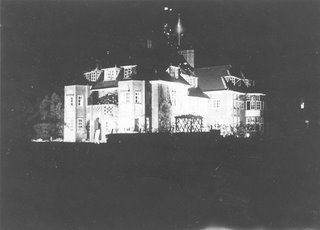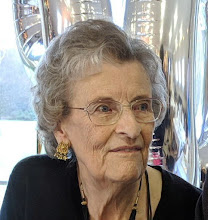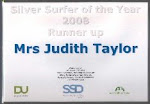 By the summer of 1939 my parents had found us a house in the country and we moved to the village of Alfrick, near Worcester. And in the September I went off for my first term in the school which I really do remember, vividly, and often revisit in my dreams. It was St Christopher School in Letchworth, Hertfordshire, where I was extraordinarily happy, and where I remained until I left school for good at the end of the war. [See the picture below of the school floodlit on VE night in May 1945.]
By the summer of 1939 my parents had found us a house in the country and we moved to the village of Alfrick, near Worcester. And in the September I went off for my first term in the school which I really do remember, vividly, and often revisit in my dreams. It was St Christopher School in Letchworth, Hertfordshire, where I was extraordinarily happy, and where I remained until I left school for good at the end of the war. [See the picture below of the school floodlit on VE night in May 1945.]It was (and is still) a co-ed boarding school, and was what was known to many as a 'crank' school. My cousin, who went to a similar school called Bedales, used to refer to them affectionately as 'lettuce and brown sugar schools', as they were vegetarian on health grounds. Staff were called by their first names or nick-names; school uniform was abandoned for ever during the war. We were encouraged to develop a strong sense of personal responsibility, and there was much more self-determination than at standard schools. In the senior school, instead of daily homework we were given assignments of work, which we were expected to complete within two weeks. This gave us more flexibility in planning the use of our time. There was also a senior school council, made up of children of the full age range, and this was empowered to make disciplinary decisions, among others. The Head used to say the only two things over which he retained the absolute right of veto, were the curriculum, and the vegetarian diet.

The headteachers, Lyn and Eleanor Harris, were Quakers, though it was not officially a 'Quaker school'. But the school gave sanctuary to conscientious objectors who were 'persona non grata' in other places, but came to teach at our school; and young male school-leavers who were COs were prepared there for their tribunals, which they had to go through if they were not to be obliged to join the armed forces. There were a number of German refugee children too, some of whom anglicised their surnames before going off to fight in the British Army.
I think I was happy there because my life was full and well-rounded, I was stretched academically and allowed to develop socially and emotionally, and I liked, admired and respected the headteachers and the large majority of the school staff. I have always considered myself lucky to have been there. My family was not well off at the time, and it was our good fortune that the head teachers believed so strongly in what they were doing, that when they realised how much our parents wanted us to attend the school, they did them a discount deal for taking my brother and myself as a job lot – so to speak!


Here I am with my younger brother, clipped from the annual whole-school photograph in the summer of 1940.
ENDPIECE: Soon after we were married my husband and I were invited to lunch in the home of one of his colleagues. Two young men joined the party, the son of the house and a mate who had just come back from a skiing holiday. They were so obviously products of a public school that it was perhaps unwise of me to start talking about the ‘crank’ school I had attended. I'm sure I actually saw the noses on the faces of these young men go up in the air and wrinkle with disdain. It was a moment that I have always cherished!




No comments:
Post a Comment